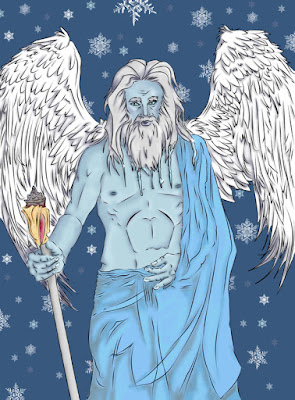BOREAS was the purple-winged god of the north wind, one of the four seasonal Anemoi (Wind-Gods). He was also the god of winter who swept down from the cold mountains of Thrake (Thrace), chilling the air with his icy breath. Beyond his mountain home lay Hyperborea, a mythical land of eternal spring untouched by the god's winds.
When Boreas sought a wife, he carried off Oreithyia ("Mountain Gale"), daughter of King Erekhtheus (Erechtheus) of Athens, who was playing with her companions in a riverside meadow. Their children included Khione (Chione), goddess of snow, and the Boreades, a pair of winged heroes.
Boreas and his brother-winds were often imagined as horse-shaped gods in form. An old Greek folk belief was that the winds Boreas and Zephyros would sweep down upon the mares in early spring and fertilize them in the guise of wind-formed stallions. The horses born from these couplings were the swiftest and finest of their kind. The fabulous horses of King Laomedon of Troy were said to have been sired in this way by Boreas upon the Trojan mares.
In Greek vase painting Boreas was depicted as a striding, winged god. Sometimes his hair and beard were spiked with ice. In mosaic art he often appears as a gust blowing head with bloated cheeks up among the clouds. This imagery carried over into post-Classical art, and is frequently found in old maps. Boreas' name is simply the ancient Greek word for "north-wind" which was perhaps in turn derived from the Greek verb boraô meaning "to devour".


Comments
Post a Comment